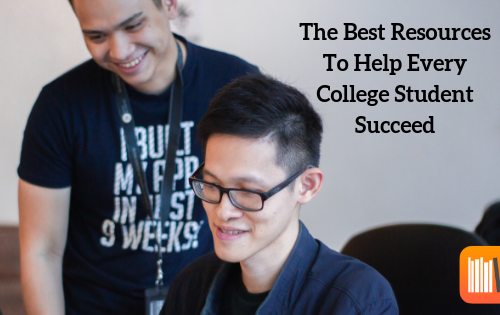
Although falling leaves often define this time of year, it can be easy also to let your midterm motivation fall. This mid-semester slump can cause significant problems for college students who become burnt out from the continuous cycle of studying. The study slump can result in slipping grades and reduced effort overall.
So, the question is how to get out of a study slump.
To outwit the mid-semester slump, here are seven midterm study tips for maintaining your internal drive and making it to finals on a high note.
1. Change Your Study Location

The first midterm tip to increase your incentive to study on a lazy, dreary Sunday is to find a fun, novel setting. I have found that going to the same place over and over to study increases the banality and drudgery of studying by falling into a boring routine.
This is especially pertinent to places like the school library that have built-in connotations of late nights, stress, and dim lighting. Find a new place in your area to buckle down and concentrate on your studies. While coffee shops and libraries are the typical standbys, sometimes a non-conventional place like a museum will have an area to study. Ensure you have access to a strong Wi-Fi connection and functioning outlets beforehand, and you’ll be ready!
If you want to stay in your pajamas and study from home (not judging—sometimes we’re the most productive when we’re comfortable), feel free to check the listicle with 16 great ideas on college dorm room decor. Not having your phone within arm’s length when studying can reduce distractions by leaps and bounds, for example. A change in scenery can help invigorate your studying routine and provide a little excitement to the doldrums of studying.
When studying, change your scenery and location to keep your mind fresh and excited about learning the course material.
2. Take It One Week at a Time
I have been guilty of looking way too far ahead in the semester, and either feeling overwhelmed at the barrage of assignments and deadlines coming my way or compiling a list way too early of all the eventual things I will have to accomplish (which often produces a feeling of discouragement by the immediate lack of progress).
Some assignments require much preparation but try to break your workload into manageable amounts. This could consist of dividing a semester-long project into weekly tasks such as ‘read these five sources’ or ‘write the first draft of the conclusion’ that are much more manageable.
Viewing the remainder of the semester as a set of weekly tasks rather than a swath of impending deadlines helps to prevent feeling overwhelmed. Taking it one week at a time makes it possible to finish the semester strong.
3. Keep Going to Class
The temptation to sleep in on a chilly November morning is as strong as the coffee needed actually to get out of bed in the first place. However, maintaining attendance is crucial at this point in the semester. It can be easy to start skipping the larger lecture-style classes where no one will realize your absence. Still, the subject matter usually becomes more challenging and cumulative after midterms.
Therefore, missing a handful of classes can set you back and make you feel behind. Keeping a semblance of a schedule is also important, as skipping one lecture can eventually lead to another. Pretty soon, your entire academic routine has been negatively altered. So, bring a big thermos of coffee and some snacks. Remember, you can always nap after 9 a.m. and muster the energy to attend class.
4. Break up Screen Time

Once the weather minimizes the frequency of outdoor activities, limiting screen time becomes much more complicated — especially when studying requires a computer most of the time. No one likes to stare at a screen all day. It becomes tiresome and can result in vision issues and headaches.
Thus, setting breaks for time spent staring at your computer is imperative. Try to find an activity where no technology is required: reading, baking, or grabbing coffee with a friend, for example- to break up the monotony of using your laptop day after day. A relaxing activity like meditation can help rest your eyes (don’t let it turn into a nap!) and reset your mind.
Not only will this improve your overall mentality, but it will also assist in making your studying timeslots as productive and efficient as possible. When you set a schedule of looking for two hours followed by an activity break, those two hours will be much more effective than if you sit down at your computer at noon on a Sunday will no real plan or timeline. Take a break from studying by doing something you love and enjoy to avoid mid-semester burnout.
5. Organization is Key

One of the biggest deterrents to motivation for working on a semester-long project is the overwhelming disorganization caused when many different sources of information about the project are scattered around various platforms.
For example, say that the project guidelines are on whichever online class portal your university uses, the professor emailed some clarifications two weeks ago, you have notes of general tips given in class last week, and to top it off, there are three different tabs open of potential sources on your computer. I got stressed writing that sentence, so I know living out a similar situation is the pinnacle of stress. Disorganization of information can halt any progress when you don’t even know where to start.
My suggestion would be to spend time solely compiling all the information about a singular project into one document or browser window. That way, you have one place to access all the relevant information easily. This compilation can then be easily synthesized, and further action steps can be created. Eliminating that enduring anxiety of where to begin a project or a college essay is crucial in avoiding a procrastination-induced mid-semester slump. By the way, you may check out great tips on how to write a college essay, do it now and maybe you will get inspired right away.
6. Read Smarter, not Harder
One of the first things to slip during mid-semester burnout is time spent reading for class. Many articles and textbook chapters can be less than interesting, and often it is possible to skate by during class without being completely prepared. Nevertheless, don’t let today’s lack of midterm motivation come back to get its revenge when an essay question appears on the final referencing the skipped reading.
Let’s be honest, though: there will always be weeks when there is not enough time to complete a reading in totality. That’s why it is essential to read smarter and not harder. By this, I mean deducing the most critical parts of the reading are and focusing on those first (you also may take notes! Read the blog post on how to take notes effectively). Prioritizing sections of an assigned reading instead of trying to go straight through will aid in absorbing what you read and not running out of time.
Sometimes it’s beneficial to skip a long anecdote containing no new information and head straight to the most information-heavy portions of the reading. Implementing strategies for active reading can help to avoid the temptation not to read altogether.
7. Maintain Study Motivation to Avoid Mid-Semester Burnout

Sometimes stress about a particular assignment can get way out of hand. When a specific project takes over your life slowly, it is time to step back and remember two things. First, every project is possible. You would not be given an assignment if there was no way to complete it. If this is incorrect, please get in touch with the professor to ask for help.
Second, no assignment is more important than your well-being. If an assignment begins to make you so overwhelmed that it becomes all-consuming, reassure yourself that this one assignment does not define who you are in any way, nor does it define your future. Just because that one paper isn’t perfect does not mean you won’t graduate and achieve your goals. At the moment, working on an assignment can seem like the most important thing in the world when it is not.
Reach out to the resources your university provides if the workload becomes too much and you need help. Study centers, academic advisors, and mental health professionals are at your disposal at most universities, so feel free to seek help when needed. Read more about the best methods to get academic help with your homework, a strong list of resources available to help you thrive on being successful in college, and further information on preserving your mental health during college.
The mid-semester slump can affect anyone, but it can be thwarted from derailing an entire semester with proper diagnosis and treatment. So don’t worry if there’s a week that goes awry! You can start again. As long as you’re aware of the situation and actively trying to improve it, the slump will merely become a brief blip on your collegiate journey. In short, find ways to change your routine by using midterm study tips to elude the study slump and find your motivation to finish semester.



